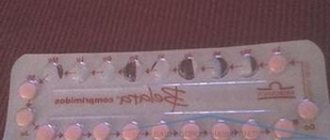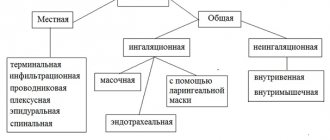Mechanism of action OK
All oral contraceptives work on the same principle. They suppress ovulation by preventing the egg from maturing and being released from the ovary. Ovulation does not occur, which means fertilization simply cannot occur. Also, OCs increase the viscosity of cervical mucus, preventing quick sperm from penetrating into the uterus. And finally, oral contraceptives provide insurance in case of pregnancy against all odds. These drugs suppress the growth of the endometrium, so that an accidentally formed embryo simply will not be able to attach to the wall of the uterus. The latter mechanism is implemented quite rarely.
Combined oral contraceptives contain two female hormones: estrogen and progesterone. The effect of using OCs is achieved only if all rules for their administration are observed. All oral contraceptives should be taken at exactly the same time every day. You can take OK for quite a long time until you want to have a child. How quickly does pregnancy occur after stopping oral contraceptives?
How to get pregnant quickly after using birth control?
If you have decided to conceive a child and stop using contraceptives (Regulon, Yarina, Jess), then you are likely to experience some problems.
In order to start conceiving after taking birth control pills, you must first consult with your doctor. Although there are several points of view here too. The likelihood of getting pregnant after using certain contraceptives depends on which hormonal drug you used. The most commonly used prescriptions are Jess tablets. In addition to them, regulon and yarina can also be used.
Interruptions or cessation of use of these medications, as well as their prescription, should occur under the strict supervision and guidance of your physician. It is also noted that Yarina, Regulon, Jess and other drugs can be prescribed not only to prevent pregnancy, but also, on the contrary, to become pregnant.
Restoration of ovulation
When taking combined oral contraceptives, ovarian function is completely suppressed. Gonadotropic hormones are not produced, and the ovaries are dormant. After discontinuation of the OC, the function of the female reproductive system is gradually restored. How quickly does this process go?
Each woman’s body is individual, and it is difficult to predict in advance how taking hormonal contraceptives will affect it. For some representatives of the fair sex, the ovaries begin to work fully within the first month, while others have to wait quite a long time for results. On average, restoration of ovarian function occurs within the next three months.
The speed of recovery of the body is influenced by many factors. It has been noticed that in young women, already in the first month after stopping the OC, the menstrual cycle returns to normal and ovulation occurs, while for women after 30 this process can drag on for 6 months or more. The duration of OC use also affects the state of the reproductive system. The longer a woman takes oral contraceptives, the more time it will take for her ovaries to regain their function.
Comment from an obstetrician-gynecologist
Obstetrician-gynecologist Anna Sozinova explains:
— Today, combined oral contraceptives (COCs) are considered the gold standard of contraception. That is, this is the most convenient method of preventing pregnancy, with minimal risk of side effects. In recent years, the list of COCs has expanded significantly, and the doses of hormones in modern birth control pills are minimal. In the 60s of the last century, taking contraceptive drugs led to significant side effects and even provoked the development of infertility.
This cannot be said about current COCs. They can be taken for contraceptive purposes for as long as desired, including for young nulliparous women (months, years). The only requirement before deciding to take COCs for a long time is their prescription and selection by a doctor. And if not so long ago it was believed that constant use of COCs requires a break for 1 - 3 months, today it has been proven that use should be continuous, without any rest, supposedly necessary so that the ovaries “do not forget how to work.” Rather, breaks in the constant use of COCs are harmful to the body; it must constantly adapt either to the supply of sex hormones from the outside, or to their independent production.
Restoration of a woman's fertility occurs 1 to 3 months after discontinuation of the drug in 90% of cases. If a woman is planning a pregnancy, she should stop using COCs 3 months before the desired pregnancy. After discontinuation of the drug, the ovaries do not require any time to recover, and, accordingly, any treatment.
All the follicles that are present in them were simply in a “dormant state” when taking COCs, but after stopping the pills, they immediately or after some time “wake up” and begin to mature, which leads to ovulation. One of the “disadvantages” of long-term use of pills and their withdrawal is the occurrence of multiple pregnancies.
If, within 12 months after stopping birth control pills, the desired pregnancy has not occurred, you should look for the cause in the woman, that is, if she has some hidden gynecological diseases that were not diagnosed before prescribing COCs. These may be underweight, late onset of menarche and late puberty, a history of menstrual irregularities, etc.
Rebound effect
Every woman who takes oral contraceptives knows about the rebound effect. After stopping the pills, the hypothalamic-pituitary system begins to intensively produce hormones that affect the functioning of the ovaries. The egg matures, ovulation occurs and fertilization occurs even in those women who could not become pregnant for a long time. The “withdrawal effect” is actively used in gynecology in the case of some forms of anovulation and infertility as a fairly quick and effective way to achieve a long-awaited pregnancy.
The maturation of two or more eggs in one cycle is another feature of taking OK. After stopping the drug, many women are surprised to learn that they are expecting twins or even triplets. This phenomenon is also associated with excessive stimulation of the ovaries. As a result of a hormonal attack, several eggs mature and fertilize at once. This effect disappears 3 months after stopping the drug.
Factors affecting the chance of conception
The essence of using oral contraceptives is to take synthetic analogues of female sex hormones - progesterone and estrogens. As a result, ovarian function is suppressed and the ovulation process ceases.
Normally, after stopping the pills, there is a fairly rapid restoration of reproductive function with the possibility of becoming pregnant after taking contraceptive medications.
However, it is important to understand that the body tends to get used to the intake of bioactive substances from the outside. When stopping the pills, it may take him a certain period of time to fully restore fertility.
Important factors that influence the speed of restoration of the ability to conceive are:
- Woman's age. At 25 years old, the process of normalizing the menstrual cycle may take 2 or 3 months, after 30 - about a year, at 35 and older - several years. This is why doctors recommend that women not delay pregnancy.
- Duration of taking pills. If contraception has been used for several months, normal ovulation may occur in the next cycle. But when a woman has been continuously taking contraceptives for years, it will take her much longer to normalize her reproductive function.
- Individual characteristics of the body. Different women have different hormone levels, some may have gynecological diseases, etc. One woman may need 1-2 months to stabilize her menstrual cycle, while another may need several years. Everything is individual, even if the age and duration of taking the drugs do not differ.
Therefore, when planning a pregnancy, you need to stop taking oral contraceptives as early as possible, taking into account the fact that the body will need several months to recover.
Menstruation
Ovulation
Fertile day
Do you want to receive a personal ovulation calendar by e-mail?
Your ovulation calendar
Planning a pregnancy
In young, healthy women, pregnancy can occur within a month after stopping oral contraceptives. For women over the age of 30, it may take a little longer to conceive a child. On average, pregnancy occurs 3 months after stopping OCs. A period of up to 12 months is considered normal. If conception has not occurred within a year, it is worth undergoing examination by a specialist.
Gynecologists do not advise rushing into pregnancy after stopping OCs. Experts recommend waiting 3 months before thinking about conceiving a child. During this period, the menstrual cycle should be fully restored and hormonal levels should return to normal. You can use condoms or other barrier methods of contraception for three months.
Women who take OCs for a long time face another danger. When taking hormonal drugs, a lack of folic acid forms in the body. A lack of this vitamin leads to the formation of neural tube defects in the fetus. This is why all women using OCs need to start taking folic acid 3 months before their planned pregnancy. It is best to think about this immediately after stopping contraceptives.
The examination before planning pregnancy is standard and includes:
- examination by a gynecologist;
- examination for major urogenital infections;
- Ultrasound of the uterus and appendages.
According to indications, the doctor may recommend undergoing a hemostasiogram, as well as visiting other specialists.
When to stop taking birth control pills?
If a married couple is planning a pregnancy after stopping birth control pills, then medical experts recommend starting to try to conceive a child 30 days after stopping the hormonal drug. This time period is necessary to restore the normal ovarian-menstrual cycle. In addition, the necessary changes must occur in the mucous membrane of the uterine cavity, which will ensure effective implantation of the fertilized egg.
With long-term use of hormonal drugs (more than 6 months in a row), you must wait at least 3 months, after which you can make regular attempts to conceive a child. During the specified time, the woman is recommended to replenish the deficiency of vitamins and folic acid in the body, since the use of hormonal drugs leads to a lack of these elements.
The course of pregnancy after discontinuation of OK
According to statistics, pregnancy in women taking OCs proceeds quite well. Oral contraceptives do not have a negative effect on fetal development in the early and late stages. The course of childbirth and the postpartum period also does not have any peculiarities. The likelihood of various pregnancy complications does not increase even after long-term use of hormonal drugs.
What to do if pregnancy occurs while taking OCs? Taking oral contraceptives in the early stages does not affect the development of pregnancy and does not lead to the formation of any pathologies in the fetus. In this situation, it is enough to stop taking the pills from the pack and undergo a standard examination by a gynecologist.
What problems might you encounter?
Almost any medical product has contraindications and side effects . Oral contraceptives have a pronounced effect. That is why they must be taken with extreme caution. After stopping birth control, some complications may occur. These include:
- Disorders of carbohydrate and lipid metabolism.
- Diseases of the cardiovascular system.
- Infertility (subject to prolonged use of OCs).
- Irregularity of menstruation.
For the purpose of pregnancy, the method of taking contraceptives for three months is most often used. Sometimes the duration of use of the drug can reach six months. Longer use has a noticeable effect on the processes of the reproductive system . Therefore, there is a possibility of developing infertility.
During use, a woman may experience side effects . If they are pronounced, it means that the OKs were chosen incorrectly. You should report the presence of symptoms to your doctor. The main side effects include:
- Dizziness and nausea.
- Decreased libido.
- The appearance of irritability.
- Increase in vegetation.
- Spotting.
- Sensitivity of the mammary glands.
IMPORTANT! In the process of selecting contraceptives, many nuances are taken into account: the patient’s age, experience of pregnancy and childbirth, weight, etc.
Features of some funds
"Gynepristone"
"Ginepristone" belongs to the category of hormonal drugs that effectively prevent unwanted pregnancy if the drug is taken within the prescribed period (within the first 72 hours after sexual intercourse). In other words, Gynepriston is an emergency contraceptive.
In order for a child to be conceived in a woman’s body, the body produces a certain hormone – progesterone. Most emergency contraceptives suppress the action of this hormone, which can negatively affect a woman's menstrual cycle.
“Gynepristone” acts differently: the components block the connection between hormones and receptors, which allows conception to not occur. Therefore, the drug is classified as a mild contraceptive without negative consequences.
The action of Ginepristone occurs immediately: in the first two hours maximum effectiveness is achieved, which lasts for twelve hours. After 72 hours, the drug is completely neutralized and eliminated from the body .
Ginepristone does not pose a threat to further pregnancy, so you can safely use it, but not abuse it. However, it does not promote conception, so there is simply no point in using it to get pregnant.
"Jess"
"Jess", unlike "Ginepristone", is a monophasic oral contraceptive drug with antiandrogenic properties.
"Jess" - birth control pills. Their main focus is hormonal contraception. However, it is also used as a medicine for non-essential purposes :
- To regulate the female cycle.
- To get rid of negative symptoms of PMS.
- To shorten menstrual days.
- To reduce blood loss.
- How to help get rid of acne and blackheads.
- To eliminate swelling and for weight control.
If pregnancy is planned while taking Jess, you can stop taking the pills at any time. According to doctors, the drug is an effective drug and hormonal contraceptive, which does not cause side effects even with prolonged use.
Therefore, when using “Jess” you don’t have to be afraid; pregnancy will occur almost immediately after discontinuation . At the same time, the pills can help get rid of acne, PMS pain and other unpleasant symptoms.
"Visanne"
"Visanne" is a medicine that is widely used in obstetric and gynecological practice. The main component of the drug is dienogest. "Visanne" has pronounced gestagenic properties that suppress the action of female sex hormones, estrogens.
Main indications for taking the drug:
- Treatment of endometriosis.
- Elimination of heavy bleeding during menstruation.
- Reduction and elimination of pain during menstruation.
- And the most important thing is preparation for conception.
“Visanne” has made many women happy with the birth of their baby, as its main components help restore reproductive function. Restoration of hormonal levels, ovulation and the endometrial layer occurs within two months.
When the drug is discontinued after two months of use, successful conception of a child occurs.
"Diana-35"
"Diane-35" is an oral contraceptive. It is as wide in its application as Visanne. The main direction of the drug is the prevention of unwanted pregnancy . In addition, it can be prescribed for the treatment of certain pathological conditions of the endocrine and reproductive systems, which are accompanied by hormonal imbalance.
"Diane-35" is an effective and safe drug. Doctors have noted that women who took the drug and subsequently stopped were able to conceive a child already in the third or fourth cycle.
The active ingredients of Diane-35 are quickly absorbed into the systemic bloodstream from the intestinal lumen. They are metabolized in the liver to form inactive breakdown products, which are excreted from the body in urine (to a greater extent) and bile. Therefore, “Diane-35” can be safely classified as one of the drugs that, after taking, quickly conceives a baby .
"Novinet"
The contraceptive effect of Novinet is a mild inhibition of gonadotropins and the cessation of ovulation. Since the dose of the estrogen component in its composition does not exceed 20 mcg per day, Novinet belongs to the new generation of microdosed contraceptives.
Blocking pregnancy is its main purpose. However, Novinet also has a number of therapeutic properties :
- Helps reduce menstrual loss.
- Helps eliminate acne and cleanse the skin of the face and body.
- Normalizes the cycle.
- Helps eliminate all symptoms of PMS.
- When taken regularly, it helps eliminate the risk of pelvic inflammation and ectopic pregnancy.
Due to the fact that Novinet is a microdosed hormonal drug, it will not be difficult to get pregnant while stopping it. But remember that for a favorable pregnancy, you need to wait two to three months before conceiving.
"Logest"
"Logest" is one of the combined contraceptives. The main active ingredients are gestodene and ethinyl estradiol. “Logest” is the same drug, the use of which does not threaten the appearance of negative and destructive consequences , even if taken for several years.
The drug has undergone numerous clinical studies, as a result of which it was found that Logest does not have a negative effect on the woman’s reproductive system. In order for conception to occur, it is enough to simply stop taking it.
Complete restoration of reproductive function occurs within three months. After their expiration, you can begin to conceive. However, physiological conception within a year is considered the norm . If pregnancy does not occur, it makes sense to consult a doctor.
It happens that the cause of temporary infertility may be nervous tension from the thought that a woman has “killed” with pills the opportunity to give birth to a baby. As soon as this problem is worked out and fears go away, conception will occur.
"Logest" only promotes pregnancy.
"Regulon"
"Regulon" is one of the most common contraceptives . The main components of the drug are ethinyl estradiol and gestagen, already known to us. In addition to oral contraception, the drug can help eliminate irregularities in the menstrual cycle, dysmenorrhea and dysfunctional bleeding in the uterine cavity. Taking Regulon during pregnancy and lactation is contraindicated. However, during planning for conception, the drug may be indicated to normalize hormonal levels.
We invite you to watch a video about the effect of the drug "Regulon" on conception:
"Yarina"
"Yarina" is an example of a contraceptive drug in which the price-quality ratio is ideal.
Once in the female body, the components of “Yarina” reduce the activity of male hormones , which, in turn, can affect the occurrence of pimples and blackheads on the skin.
Gynecologists and specialists in the field of reproductive treatment claim that the drug “Yarina” helps cleanse the skin of imperfections, eliminates acne and promotes the speedy conception of a baby.
Should I take birth control to get pregnant after stopping it?
Taking birth control pills is a matter that every woman should approach with the utmost responsibility.
The main question that concerns most: “How soon after taking the pills will pregnancy occur and will it occur at all?” The answer is clear - it will come. How soon is a purely individual question. For some, it is enough to wait a month, while for others it takes about six months to restore the functioning of the reproductive organs.
It is interesting that hormonal drugs are prescribed when planning pregnancy. The occurrence of pregnancy after stopping taking pills is called the “rebound effect” in medicine . This happens because stopping taking OCs provokes changes in hormonal levels.
Due to this effect, contraceptives are prescribed to women during infertility treatment. The course of treatment for such patients is usually short - approximately 2-4 months. But the chance of pregnancy increases significantly due to such hormonal “swings”.
However, do not forget that you cannot prescribe pills on your own . Only after diagnosis and examination will the doctor help you choose medications that will really help and not harm.
We invite you to watch a video about the importance of birth control pills when planning pregnancy:
Problems that arise after stopping birth control pills
One of the most common questions regarding pregnancy is how to quickly get pregnant after taking such medications. The solution mostly depends on what drugs you used (for example, Jess, Yarina, Regulon). However, you will be able to get pregnant quickly if your ovulation is completely restored quickly enough.
So, when taking birth control pills (Yarina, Jess, Regulon), it should be noted that generally ovulation begins to recover almost immediately after taking birth control pills, so in this case this function can be reconfigured already after 2 months after stopping taking the pills Jess, Regulon or Yarina.
In some representatives of the fair sex, the neurohormonal background and ovulation can be restored literally immediately, and they do not even manage to find out when they can get pregnant, since with a full sexual life, immediately after stopping the use of the drugs Jess and Yarina, they find themselves pregnant.
While some people need to wait several months (sometimes even years) until they can get pregnant. Symptoms are often observed in which, after stopping taking Jess tablets, some other pills or drugs, the first 2 menstrual cycles turn out to be quite long or random. Usually, after this, the cycle should be completely restored, and ovulation will begin to occur. This will be evidence that you can take the process of conceiving a child seriously. And, most likely, pregnancy will occur in 2-3 months after taking contraceptives.
The drug that causes you to wait until you can get pregnant after taking it is Depo-Provera. This is exactly what is injected. It acts on the uterus, liquefying its surface, so that late implantation of the embryo does not occur.
As a result of exposure to this drug, the amount of the hormone progesterone in the body increases. Gradually it accumulates more and more, and as a result reaches its maximum value. It takes several months to restore reproductive function. Therefore, you will have to wait about a year to get pregnant. The probability of getting pregnant remains quite high.










